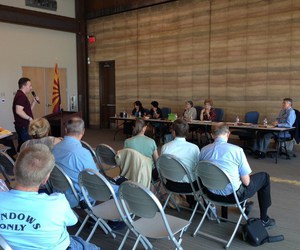
The Pinal County Community College District Governing Board voted Tuesday to cut back a property tax increase that had gained both support and opposition from county residents.
In a 3-1 vote, the board approved an increase of 28 cents for every $100 of assessed property value for residents living in the district. In other words, residents with a $100,000 home will see a primary property tax increase from $161.18 per year to $189.18 – or a $28 jump.
Prior to Tuesday’s meeting, the board was considering a higher increase that would have been $55 for residents with a $100,000 home, which would have resulted in an annual primary property tax bill of $216.18.
The special meeting to adopt both the budget certificate and tax levy was held at Central Arizona College’s new Maricopa campus. A call to the public was held before a vote was taken. More than 25 county residents spoke to the board, expressing both support and opposition to the tax increase.
Board member Gladys Christensen proposed the motion to reduce the increase.
Prior to her motion, Christensen said the board must represent all of Pinal County – both constituents in favor of the increase and those against.
“I complain about the lack of compromise in Washington D.C., so I feel like certainly we might try it in Pinal County,” Christensen said.
Central Arizona College president and CEO Doris Helmich said several factors contributed to the consideration of raising taxes.
Since 2008, the college has seen a 65 percent cut in state funds. At the meeting, Chris Wodka, vice president of financial and administrative services, said annual state funding has reduced from $10 million to $2 million in the last few years, resulting in an $18 million lost over the past three fiscal years.
“When we were getting the $10 million, enrollment wasn’t as high as it was now,” Helmich said.
A drop in the county’s assessed property valuation and the opening of the Maricopa and San Tan campuses also have contributed to the need for an increase, she said. With a new campus comes many fixed costs, she explained, such as utilities, sewage, water, maintenance in addition to funding staff and faculty.
Board members explained to the public that with the approval of a lower increase, the college will have to dip into reserve funds to cover any remaining costs.
***ADVERTISEMENT***Helmich said college officials now will have to hold a “severe cost-containment” discussion.
“We have to have cost containment discussions and we need to prioritize: What are the things that are necessary to get the campus open and to provide minimal services?” she said. “And then we’ll take another look next year at the demand for increased services and we’ll make decisions there. But I don’t think now is the time to expand our services.”
Debra Banks was the only board member to vote against the increase.
After stating “no” in a roll call vote, she stated: “I think there’s another way.”
An additional increase to the secondary property tax levy – from $26.96 to $35.89 for residents with a $100,000 home – is for the repayment of bonds issued for the constructing the new campuses. Helmich said the bonds could only finance construction, not operation of the campuses.






![Maricopa sheds tears amid Maui wildfires that killed dozens For Maricopa resident Janelle Gomez, the sorrow mirrors the loss of a family member. [Brian Petersheim]](https://www.inmaricopa.com/wp-content/uploads/2023/08/Gomez-218x150.jpg)
![Embracing Freedom: Celebrating the Fourth of July Councilmember Vincent Manfredi at Great American 4th 2021 [Victor Moreno]](https://www.inmaricopa.com/wp-content/uploads/2023/07/2021-Great-American-4th-e1688414543522-218x150.jpg)



![Maricopa restaurateur makes Food Network connection [Namkeen Dhaba]](https://www.inmaricopa.com/wp-content/uploads/2024/04/439456716_377105198650519_7536248579664805896_n-218x150.jpg)

![Merging lanes incite more 347 anger A merging lane sign sits on the side of State Route 347 northbound lanes during evening traffic on April 30, 2024. [Monica D. Spencer]](https://www.inmaricopa.com/wp-content/uploads/2024/04/spencer-043024-adot-merging-lanes-347-web-218x150.jpg)



![O’Reilly gears up for second Maricopa location An exterior view of O'Reilly Auto Parts on John Wayne Parkway on May 2, 2024.[Monica D. Spencer]](https://www.inmaricopa.com/wp-content/uploads/2024/05/spencer-050224-oreilly-second-location-web-100x70.jpg)